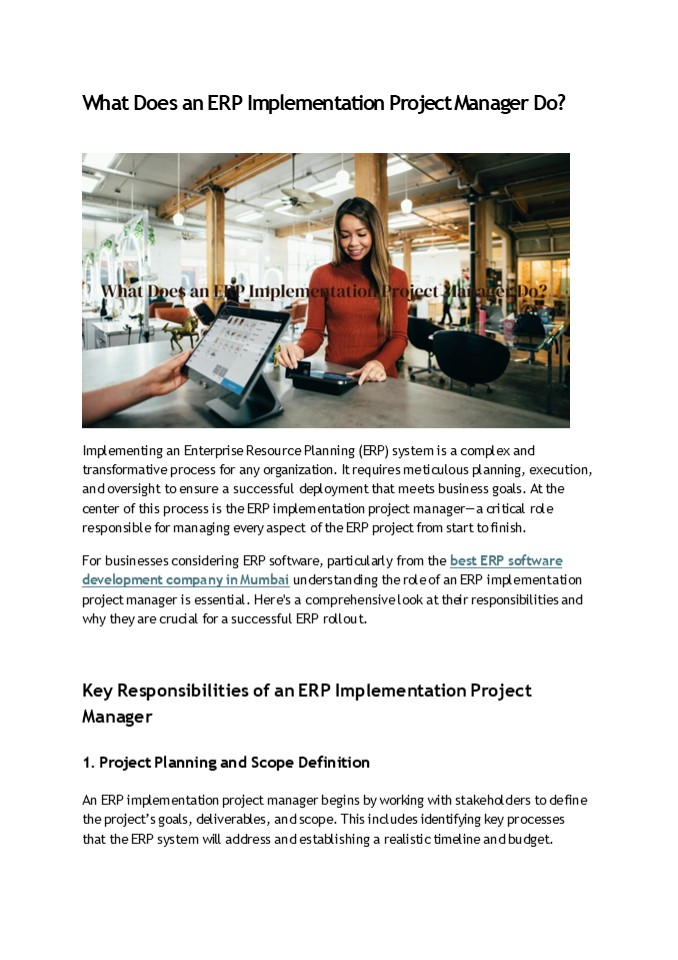What Does an ERP Implementation Project Manager Do - PowerPoint PPT Presentation
Title:
What Does an ERP Implementation Project Manager Do
Description:
For businesses considering ERP software, particularly from the best ERP software development company in Mumbai understanding the role of an ERP implementation project manager is essential. Here's a comprehensive look at their responsibilities and why they are crucial for a successful ERP rollout – PowerPoint PPT presentation
Number of Views:1
Title: What Does an ERP Implementation Project Manager Do
1
What Does an ERP Implementation Project Manager
Do?
Implementing an Enterprise Resource Planning
(ERP) system is a complex and transformative
process for any organization. It requires
meticulous planning, execution, and oversight to
ensure a successful deployment that meets
business goals. At the center of this process is
the ERP implementation project managera critical
role responsible for managing every aspect of the
ERP project from start to finish. For businesses
considering ERP software, particularly from the
best ERP software development company in Mumbai
understanding the role of an ERP implementation
project manager is essential. Here's a
comprehensive look at their responsibilities and
why they are crucial for a successful ERP rollout.
Key Responsibilities of an ERP Implementation
Project Manager 1. Project Planning and Scope
Definition An ERP implementation project manager
begins by working with stakeholders to define the
projects goals, deliverables, and scope. This
includes identifying key processes that the ERP
system will address and establishing a realistic
timeline and budget.
2
- Their expertise ensures that the project is
aligned with business objectives and avoids scope
creep, a common challenge in large-scale ERP
projects. - Vendor and Stakeholder Coordination
- Implementing ERP software often involves
collaboration with external vendors, such as an
ERP software implementation company in Mumbai .
The project manager serves as the bridge between
the organization and the vendor, ensuring clear
communication and alignment. - They also coordinate between internal
stakeholders, such as department heads and
end-users, to ensure the system meets
organizational needs. - Team Leadership and Resource Management
- ERP implementation requires a dedicated team of
IT specialists, functional consultants, and
end-users. The project manager is responsible for
assembling this team, assigning roles, and
ensuring efficient resource allocation. - They act as a leader who motivates the team,
resolves conflicts, and ensures everyone is
working towards the shared project objectives. - System Customization and Configuration Oversight
- Every business has unique needs, and ERP software
must be customized accordingly. The project
manager oversees the customization and
configuration process, working closely with the
vendor or internal development team to ensure the
system integrates seamlessly with existing
workflows. - For instance, businesses partnering with the best
ERP software development company in Mumbai will
benefit from the project managers ability to
ensure customizations align with specific
business processes. - Risk Management and Problem Resolution
3
- Training and Change Management
- One of the most critical roles of the project
manager is managing organizational change.
Employees must adapt to the new ERP system, which
can involve a steep learning curve. The project
manager oversees training sessions, ensuring
users are comfortable and proficient with the
system. - They also help manage resistance to change by
communicating the benefits of the ERP and
addressing employee concerns. - Testing and Quality Assurance
- Before the ERP system goes live, rigorous testing
is essential. The project manager coordinates
testing phases, such as unit testing, system
testing, and user acceptance testing (UAT). - They ensure that the system performs as expected,
is free of critical bugs, and meets the
organization's requirements. - Go-Live and Post-Implementation Support
- The project manager oversees the critical go-live
phase, ensuring a smooth transition to the new
ERP system. They monitor the systems
performance, address any initial issues, and
coordinate with the vendor for technical support. - Post-implementation, they ensure that the system
is fine-tuned based on feedback and that all
stakeholders are satisfied with the outcomes. - Why is an ERP Implementation Project Manager
Important? - Implementing an ERP system without a skilled
project manager can lead to inefficiencies,
delays, and even project failure. A project
manager ensures that - The implementation stays on schedule and within
budget.
4
Conclusion An ERP implementation project manager
is the linchpin of a successful ERP rollout.
Their expertise in planning, coordination, and
risk management ensures that businesses achieve
maximum value from their ERP system. With the
right project manager at the helm, your ERP
implementation will be a smooth, transformative
journey toward greater efficiency and growth.































